World News

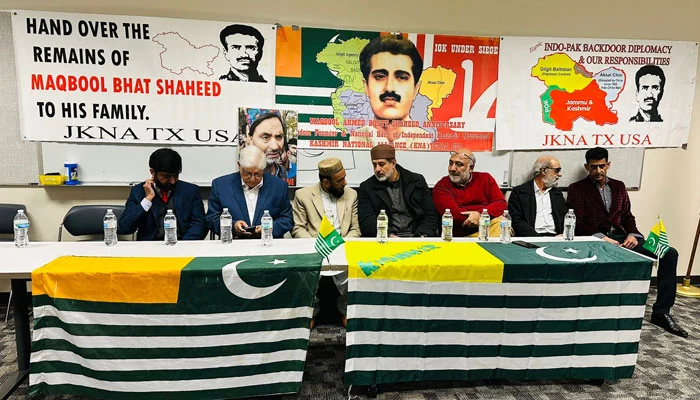
DALLAS: The Unity of Kashmir conference marked the anniversary of Baba-e-Qaum (Father of the Nation) Maqbool Butt Shaheed in Austin, Texas.
The event, oragnised by JKNA, attracted political and social leaders, including prominent figures such as Palestinian leader Hasan Ali and human rights representative Rae Zafar Iqbal. The conference addressed various aspects related to the Kashmir issue.
The attendees passionately called for the repatriation of the bodies of Muqoob Butt Shaheed and Afzal Guru Shaheed to their heirs. They advocated for the release of political prisoners, notably Yasin Malik, a symbol of resistance currently held in Tihar Jail. The conference also emphasised the need for global intervention to halt the tragic events unfolding in Palestine, urging the international community to play an active role.
The demands of the ongoing popular movement in Kashmir were reiterated, highlighting the importance of fulfilling these aspirations. Among these demands were calls for India and Pakistan to withdraw their forces from the state of Jammu and Kashmir. Additionally, there was a proposal to redirect the arms and defense budget towards addressing poverty, ignorance, bankruptcy, and terrorism in the region.
A notable suggestion that echoed through the conference was the idea of an Asian Union, drawing parallels to the European Union.
The speakers envisioned an independent Kashmir within an Asian Union, fostering cooperation and friendship between India, Pakistan, and China. This concept was seen as a potential avenue for peace and increased trade in the region.
The event featured distinguished speakers, including Raja Muzaffar, Sardar Anwar Advocate, Javed Aslam, Sardar Imtiaz, Sajjad Asghar, Safir Khan, Shazia Kamran, Tariq Advocate, Rizwan Aslam, Hasnain Sagheer, and the original Khan, each contributing to the discourse on the future of Kashmir and its relation to the broader geopolitical landscape.
The conference aimed to generate awareness, garner support for the Kashmir cause, and explore avenues for lasting peace and cooperation in the region.
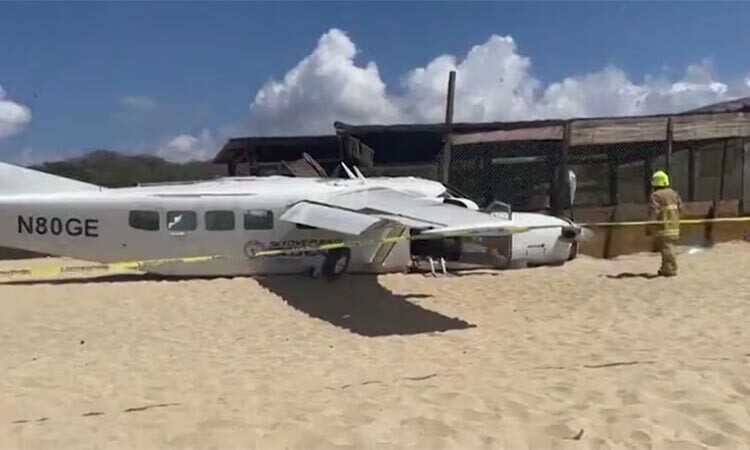
A plane carrying four Canadian skydivers made an emergency landing on a beach in the southern Mexican state of Oaxaca on Sunday, the state civil defence’s office said, resulting in the death of a 62-year-old man who was on the beach at the time.
The plane was forced to land on a populated section of Bacocho beach in the popular Pacific resort town of Puerto Escondido, the office said in a statement, adding the victim’s wife, who had been on the beach alongside him, was unharmed.
Footage from Puerto Global showed the damaged aircraft on the beach having crashed into what it said was a turtle rescue centre.
The civil defense statement did not give more details on the landing nor the identities of those involved, noting that investigations were ongoing. No one else on the beach was injured, it said.
Those who had been on the aircraft, including the four Canadian skydivers aged between 35 and 60 and a 40-year-old Mexican man, were removed from the plane and taken for medical treatment, the statement added, saying they were in stable condition.
State Governor Salomon Jara said in a post on X that resources were being mobilized to help those the injured who had been on the plane.
“To the family of the person who died, we will provide all the necessary support and accompany them in the face of their irreparable loss,” he said.

Top Western officials criticised former United States president Donald Trump on Sunday after he suggested the country might not protect Nato allies who aren’t spending enough on defence from a potential Russian invasion.
“Any suggestion that allies will not defend each other undermines all of our security, including that of the US, and puts American and European soldiers at increased risk,” said Nato Secretary General Jens Stoltenberg in a written statement.
“Any attack on Nato will be met with a united and forceful response,” he added, reacting to remarks on Saturday by Trump, who is likely to be the Republican nominee in this year’s US presidential election.
Polish Defence Minister Wladyslaw Kosiniak-Kamysz also weighed in.
“Nato’s motto ‘one for all, all for one’ is a concrete commitment. Undermining the credibility of allied countries means weakening the entire Nato,” he wrote on social media platform X.
“No election campaign is an excuse for playing with the security of the alliance.”
Germany’s foreign ministry posted the message ‘One for all and all for one’ with the hashtag #StrongerTogether on its English language X account following Trump’s comments.
European Union Council President Charles Michel said: “Reckless statements on Nato’s security and Article 5 solidarity serve only [Russian President Vladimir] Putin’s interest.”
Article 5 of the Nato treaty says that an armed attack against an alliance member will be considered an attack against them all, triggering collective self-defence.
Trump, speaking during a political rally in South Carolina and appearing to recount a meeting with Nato leaders, quoted the president of “a big country” that he did not name as asking, “Well sir, if we don’t pay, and we’re attacked by Russia — will you protect us?”
“I said: ‘You didn’t pay? You’re delinquent?’ He said: ‘Yes, let’s say that happened.’ No, I would not protect you. In fact, I would encourage them to do whatever the hell they want. You gotta pay.”
“We have heard that before […] Nothing new under the sun”, said EU Internal Market Commissioner Thierry Breton in an interview with France’s LCI television, adding: “He maybe has issues with his memory, it was actually a female president, not of a country, but of the European Union,” Breton said, referring to European Commission President Ursula Von der Leyen and a conversation she had with Trump in 2020.
“We cannot flip a coin about our security every four years depending on this or that election, namely the US presidential election,” Breton said, adding that EU leaders understood the bloc needed to boost its own military spending and capacities.
White House spokesperson Andrew Bates, asked about Trump’s comments, said, “Encouraging invasions of our closest allies by murderous regimes is appalling and unhinged — and it endangers American national security, global stability and our economy at home.”
Nato’s 31 members have agreed on a target of spending at least two per cent of gross domestic product on defence, but Nato estimates have shown that only 11 are spending that much.
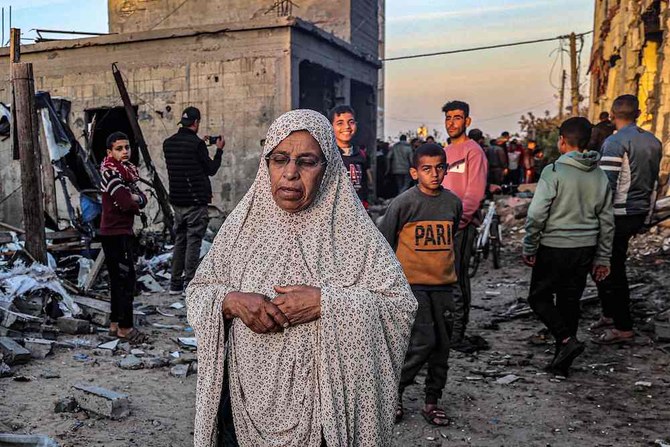
Egypt has warned of “dire consequences” of a potential Israeli military assault on the south Gaza city of Rafah near its border, Reuters reports.
“Egypt called for the necessity of uniting all international and regional efforts to prevent the targeting of the Palestinian city of Rafah,” its foreign ministry added in a statement.
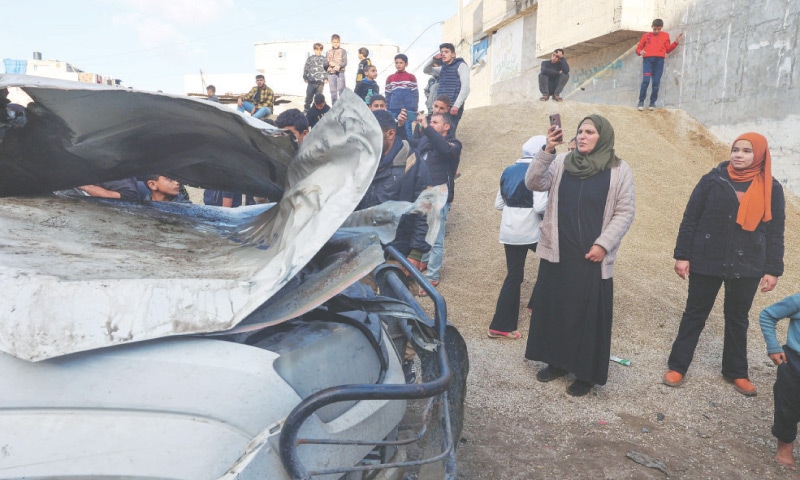
GAZA STRIP: Israeli air strikes killed 117 Palestinians during the past 24 hours, the health ministry in Gaza Strip said on Saturday as over a million Palestinians cramming into the border city of Rafah await a full-blown offensive, with nowhere left to run.
Unlike in previous Israeli assaults on the besieged territory’s cities, when the military ordered civilians to flee south, no other relatively unscathed area remains in the tiny Gaza.
Israeli Prime Minister Benjamin Netanyahu’s office said it had ordered the military to develop a plan to destroy “four Hamas battalions dep-loyed there”, despite repeated warnings from several countries and aid agencies that civilians in large numbers could die.
With the latest addition of 117 killings over the past 24 hours, the death toll in the besieged territory has surpassed 28,000 during the past four months.
“Any Israeli incursion in Rafah means massacres, means destruction. People are filling every inch of the city and we have nowhere to go,” said Rezik Salah, 35, who had to flee his Gaza City home, with his wife and two children for Rafah in October after the Israeli resumed its agression against Palestinians.
With Israeli forces destroying swathes of towns with air strikes, artillery fire and controlled detonations, more than 85 per cent of Gaza’s 2.3 million residents have been rendered homeless.
Israeli forces were continuing “intensive” operations in Khan Yunis, northern and central Gaza as well as the border town of Rafah.
In Gaza City, the first major city that Israel’s operation targeted after ground forces invaded in late October, residents reported fierce fighting on Saturday.
The continued operation in Gaza City, months after it began and long after Israel said it was redeploying some troops to other areas, shows the limitations of any proposal to evacuate displaced people from Rafah to other parts of the enclave.
Doctors and aid workers are struggling to supply even basic aid to Palestinians sheltering around Rafah.
The Palestinian presidency said Netanyahu’s plans aimed to displace Palestinians from their land. “Taking this step threatens security and peace in the region and the world. It crosses all red lines,” said the office of Mahmud Abbas, head of the Palestinian Authority that exerts partial self-rule in the Israeli-occupied West Bank Also, the UN said Palestinian civilians in Rafah required protection, but there should be no forced mass displacement, which is barred by international law.
“No war can be allowed in a gigantic refugee camp,” said Jan Egeland, secretary general of the Norwegian Refugee Council, fearing a bloodbath if Israeli troops move into Rafah.
“There is a sense of growing anxiety, growing panic in Rafah,” said Philippe Lazzarini, the head of the UNRWA agency. “People have no idea where to go.”
On the other hand, the United States also declared it would not back an assault that did not protect civilians, and had briefed Israel on a new US national security memorandum reminding countries receiving military aid to adhere to international law.
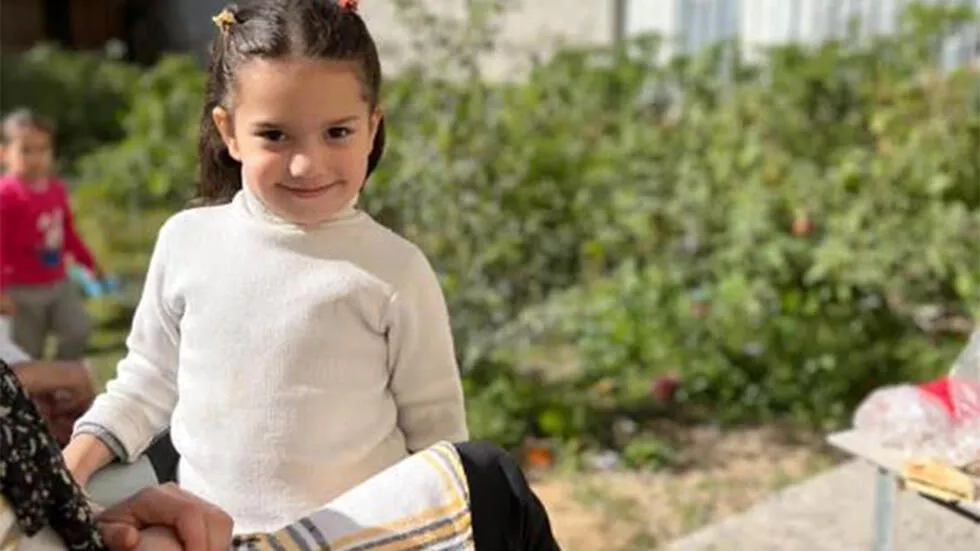
GAZA: The lifeless body of a six-year-old Palestinian girl, Hind Rajab, who had been missing for 12 agonizing days, was discovered along with the bodies of two medics who were on a rescue mission after an Israeli tank targeted their family car in Gaza. The Palestine Red Crescent Society (PRCS) and the girl’s family confirmed the tragic deaths of all seven occupants of the vehicle. Yusuf Zeino and Ahmed al-Madhoun, PRCS crew members, were among the casualties of the Israeli attack on civilians in Gaza City.
According to reports from the Palestinian news agency Wafa, family members found Hind’s body, along with those of her uncle, aunt, and their three children, near a roundabout in Gaza City’s Tal al-Hawa suburb. Hind’s uncle, Sameeh Hamadeh, noted that the car bore numerous bullet holes, indicating the severity of the attack.
The PRCS issued a statement accusing the Israeli military of deliberately targeting the ambulance sent to rescue Hind and her family. Despite prior coordination to ensure safe access, the ambulance crew was attacked, exacerbating the already dire situation.
Earlier, the PRCS released an audio recording in which Hind could be heard pleading for help during a three-hour phone call with a member of the rescue team. Tragically, all her family members are believed to have been killed before her, leaving her alone and terrified amidst their corpses.
Israeli military initially claimed ignorance of the incident. The PRCS, in a bid to draw attention to the plight of Palestinian healthcare workers facing constant attacks, had been counting the hours since losing contact with Hind and the rescue team.
In a heart-wrenching audio clip released earlier, Hind’s mother recounted speaking to Hind and her 15-year-old cousin, Layan Hamadeh, who was with her in the car when the attack occurred. The terrified Layan described the situation as gunfire erupted around them before the line abruptly went dead.
The ordeal of Hind, as depicted in the distressing audio recordings, underscores the unbearable conditions faced by civilians amid Israel’s relentless assault on Gaza. Many governments have condemned the onslaught as a “genocide,” with the Israeli military reportedly claiming the lives of nearly 28,000 people, predominantly women and children, since October 7.
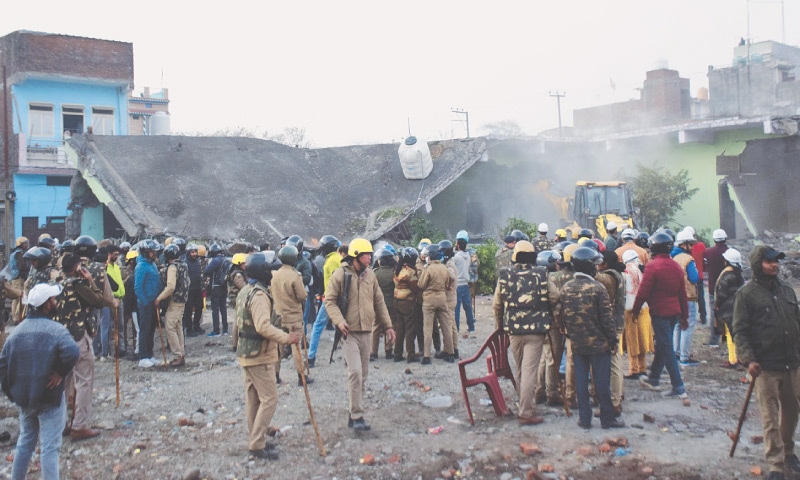
DEHRADUN: Five people were killed in India and dozens more injured after religious clashes sparked by the destruction of a madressah, the latest in a spate of demolitions targeting Islamic structures, on Friday.
Hindu nationalist groups have been emboldened in their campaign against Muslim religious structures since Prime Minister Narendra Modi took office a decade ago.
Authorities in the northern state of Uttarakhand bulldozed the Islamic school and an adjoining prayer site on Thursday, claiming they had been built without permission.
Police said Muslim protesters threw stones at them in the protests that followed, prompting them to fire tear gas in response.
Five people had been killed in the clashes in Haldwani district, local official Vandana Singh said.
Five dead, dozens injured; curfew imposed, internet suspended in Uttarakhand areas
Ms Singh earlier told reporters that dozens of others were being treated at “various hospitals”.
“Orders have been given to shoot the rioters on sight,” she said.
Footage of the clashes posted on social media showed Hindu residents of the district chanting anti-Muslim slogans and throwing stones at the crowd.
Authorities in Haldwani suspended internet services, closed schools, imposed a curfew and banned large gatherings after the violence broke out.
Security forces were also rushed into the area from other parts of the state to contain the unrest, officials said.
Uttarakhand Chief Minister Pushkar Singh Dhami said the government would punish anyone found to have participated in the unrest.
“Anyone who attempts to disturb the peace will not be spared,” he said in a Friday social media post.
Calls for India to enshrine Hindu supremacy in law have rapidly grown louder since Mr Modi took office in 2014, making the country’s roughly 210-million-strong Muslim minority increasingly anxious about their future.
Thursday’s violence comes at an especially sensitive time, with nationalist activists stepping up a long campaign to replace several prominent mosques with Hindu temples.
Mr Modi inaugurated a grand new temple last month in the northern city of Ayodhya, built on the site of a centuries-old mosque that was destroyed by Hindu zealots.
That demolition in 1992 sparked sectarian riots that killed 2,000 people nationwide, most of them Muslims.
The clashes also come days after Uttarakhand’s legislature passed a polarising common civil code to replace existing religious laws governing marriage, divorce and inheritance.
Muslim groups across India have objected to the new law, saying it is a violation of their religious freedom.


